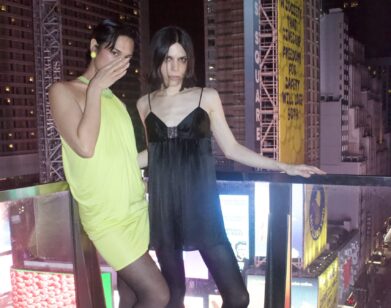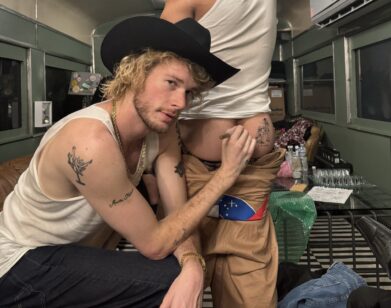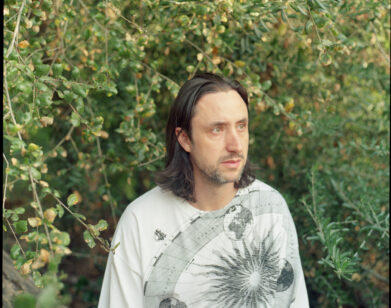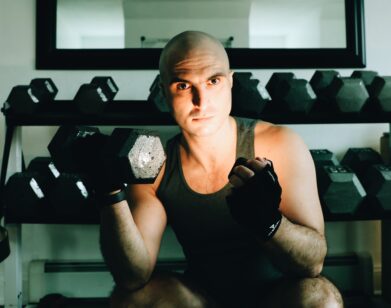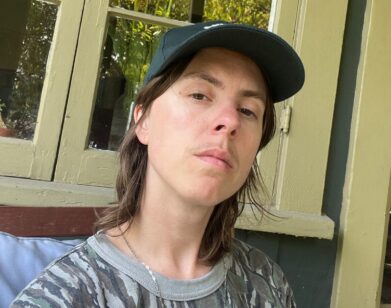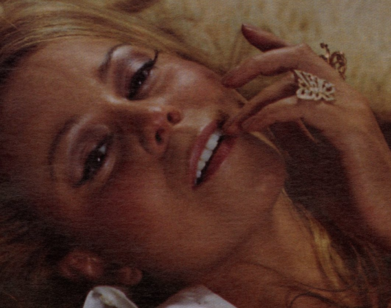Devon Welsh on Growing a Mustache, Psychedelics, and True Love
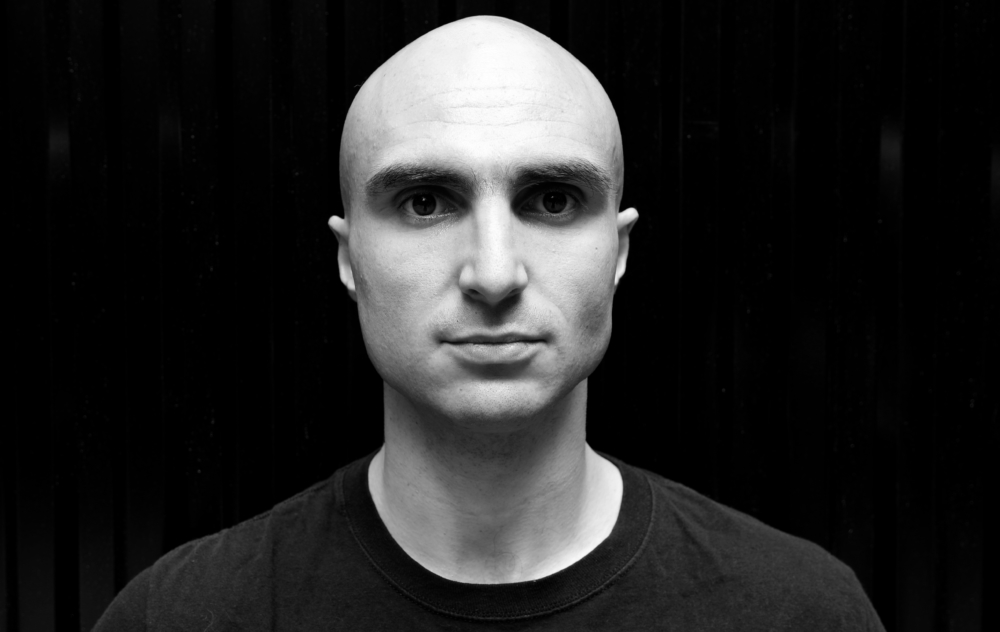
Photo by NIKA
On his latest album, True Love, Devon Welsh is singular. That’s not to say that the incisive singer-songwriter is alone in the world, but it wouldn’t be such a bad thing if he were. “I think it’s been more solo than the first one,” Welsh says of this release, his sophomore outing following the dissolution of his electro-pop group Majical Cloudz. It’s safe to say that for Welsh, who moved from his native Montreal to rural Wisconsin before making this album (“I think a change of scenery can give you a new perspective on who you could be,” Welsh tells me) there’s something about the broader concept of alone-ness that feels both vital and terrifying.
That comes across on True Love, a record with such a big name —Googling “What is true love?” brings back 3,460,000,000 attempted articulations — it could easily become an abstraction. But rather than preaching some grand theory, Welsh stresses the personal, thriving in the ever-changing grey-space of subjectivity. Songs like “Grace,” a meditative, acoustic track that sees Welsh attempting to distinguish between the “real or the easy Grace,” seem to prick gently at the impulse to give into outside forces before looking inward. Still, when I ask if his album intentionally grapples with looming structures and archetypes, he says no. “When I sit down to write a song, there won’t really be an intention,” he says. “There’ll just be the intention to write a song. If anything, it’s just about concocting something that’s easy to understand.”
Ironically, it’s this earnest simplicity that makes Welsh’s music feel so definitive. The instinct to translate the personal to the public, to find the communal in the close-to-home, is what makes the album so effective—and affecting. With this in mind, I asked Welsh his point of view on everything from acid to Roswell to the Xeroxed drawing his dad framed when he was five—all in the style of Glenn O’Brien’s iconic 1977 interview with Andy Warhol. Fittingly, Welsh’s perspective(s) on how psychedelics shake things up could just as easily serve as his take on the true nature of true love: “It’s not set in stone,” he says, thinking of our relationships to the world and to each other. “It’s certainly not objective.” And then there were 3,460,000,001.
———
JADIE STILLWELL: What was your first work of art?
DEVON WELSH: Before I answer, Andy Warhol answers these questions with only a few words, and I know that that’s his style, but I don’t know if there’s some sort of faux pas depending on how many words I use.
STILLWELL: You’re free to use as many words as you want. No judgement.
WELSH: Okay. The first thing that came to mind was just a drawing that I had made that my father then made Xerox copies of, and then he framed one of them when I was a kid. It was just, like, a stick figure, but he was very excited about it, and I think that made me feel excited about it, too.
STILLWELL: How old were you when you did that?
WELSH: I would say five.
STILLWELL: What did you do for fun as a teenager?
WELSH: I watched TV. I lived outside of a town, in the country, and so some people that I knew could hang out. But then when I was at home, I couldn’t really go anywhere. So I watched a lot of TV, and I read a lot of books, and I spent a lot of time on MSN Messenger. Then I played sports, and then I started playing music. I played Diablo II and made music on the computer with my friend. And I smoked marijuana.
STILLWELL: That’s one of the other questions. Now you’ve answered it. Did people say you had natural talent?
WELSH: I was voted most dramatically talented at my high school prom.
STILLWELL: Did you do theater?
WELSH: I sort of did. My dad is an actor, and I grew up in a small town. He was on the CBC a lot in Canada, and so he was a well-known face and a well-known actor. A lot of people would say, “Oh, you’re going to be an actor when you grow up, aren’t you?” That was something I always heard. And I accepted that up until a point, and then after that I was like, “I’m not going to be an actor. No way. Because that’s not me.” So then I didn’t audition for the high school plays, but I really loved drama. In my classes, I really enjoyed it, and my drama teacher was the director. So he would always create little parts that I could play. It would be a background kind of thing. Like we did West Side Story, and I was one of the members of the Sharks that never actually had a line.
STILLWELL: Who was the first artist to influence you?
WELSH: The first artist that I ever remember enjoying as a child was Mariah Carey. I also remember the first CD that I ever wanted to listen to on my own was Sarah McLachlan. But the first thing that influenced me in terms of actually creating something myself was probably punk music in general. Because I didn’t really know a lot about it, but other people that were making music were into different punk and hardcore bands. So then I started playing that music. Probably inspired by like just other local bands like, “Oh, they’re playing music. We should play music, too.”
STILLWELL: Did you go to the movies a lot?
WELSH: I did go to the movies a lot when I was young. Me and my friend, Nicholas, would go to the movies together all the time.
STILLWELL: Do you ever think about politics?
WELSH: All the time.
STILLWELL: Do you vote?
WELSH: Yes.
STILLWELL: What is your favorite of all of your work?
WELSH: Oh, that’s such a tough question.
STILLWELL: They get harder.
WELSH: There’s probably an interesting answer to this, but I don’t know what it is. If I had to say something, I would probably say the song, “This Is Magic,” from the first Majical Cloudz album because I remember the moment that I wrote it was kind of like a moment of flipping a lot of self-doubt into self-confidence. I was very insecure and scared and, at some point, I realized that there was really nowhere to go in that direction, and that there was nothing to lose by just deciding to reverse it. And I feel like writing that song, that was sort of a moment where that happened in my life.
STILLWELL: What’s your favorite color?
WELSH: My favorite color is green.
STILLWELL: A specific green or just green?
WELSH: Like a forest-y green. I don’t know the names of the different colors, but something that’s sort of dark, not very fluorescent.
STILLWELL: Have you ever taken acid?
WELSH: Yes. I think psychedelic drugs have had a positive effect on my identity and my life. When I was in high school, I remember I got into smoking pot, and then I watched Fear and Loathing in Las Vegas, and things like that. So I found out about psychedelic drugs, and then I was like, “Oh, this is interesting. What is this?” Then I read the book, The Electric Kool-Aid Acid Test by Tom Wolfe, and I decided that I really needed to try psychedelic drugs as a kind of exploration. It was like, “Wait, I can eat this thing, and then I perceive everything differently? That’s pretty cool.” So I tried it. I feel like so many formative experiences have involved something like that. And I think they’re important because they let you see that the way that you think of yourself, the way that you think of the world, the way that you think of your relationships, you can see it all differently. It’s not set in stone. It’s certainly not objective.
STILLWELL: Do you make music every day?
WELSH: Not every day.
STILLWELL: Would you like to live in outer space?
WELSH: Absolutely not. I feel like existence would lose all meaning, and I would be afraid to know what direction that would take.
STILLWELL: Do you know how to drive?
WELSH: Yes. I’ve driven across Canada with other people twice, and then I’ve driven all across the United States many, many times.
STILLWELL: Do you look in the mirror when you get up in the morning?
WELSH: No.
STILLWELL: How much time do you spend on the phone every day?
WELSH: Oh. Either looking at it or talking? I don’t know, but probably a lot of time.
STILLWELL: Do you think you’re a father figure to anyone?
WELSH: I don’t know. I would say, if anything, maybe an older brother figure. I don’t think I’m at father status yet. I don’t think the age discrepancy between my myself and anyone I know is that far away yet.
STILLWELL: Have you ever gone to see a psychiatrist?
WELSH: Yes.
STILLWELL: Have you ever hated anybody?
WELSH: Yes.
STILLWELL: Have you ever been in love?
WELSH: Yes.
STILLWELL: Have you ever tried to grow a mustache?
WELSH: Yes.
STILLWELL: How did that go?
WELSH: It went very well. I loved it. It’s just that everyone in my life whose romantic affection I was interested in was not interested in me having it.
STILLWELL: So it went well and not well?
WELSH: I really enjoyed it. It was a nice time in my life.
STILLWELL: Do you believe in flying saucers?
WELSH: No.
STILLWELL: No? You don’t think there are aliens?
WELSH: I mean, I’m sure there are aliens. But do I believe in, like, the Roswell story? I certainly think the probability is very high that there’s some kind of other life in the universe. But the Roswell thing probably didn’t happen.
STILLWELL: Do you know how to dance?
WELSH: Yes.
STILLWELL: Do you dance well?
WELSH: I think so. I’ve been complimented on it before, and I think my best attribute as a dancer is my endurance and commitment.
STILLWELL: Do you believe in the American dream?
WELSH: I think I believe in the American dream in the sense of the Declaration of Independence and the idea of liberty. I believe in that. I believe in the principles that America presents.
STILLWELL: I sense a “but” coming.
WELSH: But… I don’t know. It’s obviously not real. I mean, it’s as real as any of our aspirations are, so it’s always possible, and maybe it’s a good thing to put on the horizon.
STILLWELL: Do you think the world can be saved?
WELSH: I hope so. I guess the only thing that could save it is itself.
STILLWELL: Do you believe in God?
WELSH: I do in a sense that I trust in my total ignorance of reality, and that makes me sort of believe in God. Or just in my total ignorance as to the nature of reality and of existence. My total ignorance is an experience of God, in a way.
STILLWELL: Do you have any secrets that you’ll tell after everyone else is dead?
WELSH: I would tell them all, but who would I tell them to?

